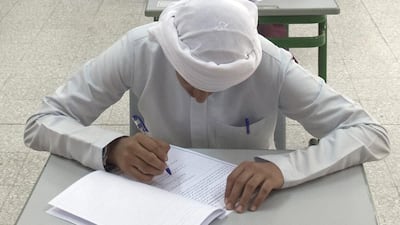School operators are struggling to recruit enough trained teachers to fill thousands of new positions.
Gems Education, one of the largest private schools operators in the UAE, and Sabis, which runs the International School of Choueifat, say the trend is driving investment in teacher training.
“There is a scarcity of good teachers, and any hub that is considered a good source of teachers is being approached by operators globally,” said Victor Saad, the vice president and board member of Lebanon’s Sabis. “There is a dependence on expats across the Middle East and North Africa region and there is a challenge of finding the right teacher, and that is leading to more investment in research and development in trying to create quality teachers.” He said demand for good teachers was driving up salaries.
At Sabis, staffing costs take up to 70 per cent of the operating expenses. It runs 59 schools in 17 countries.
He was speaking on the sidelines of the Education Investment Mena conference in Dubai.
Gems, which runs more than 50 schools in 19 countries, this year recruited 1,600 teachers for the UAE alone, said Dino Varkey, the group chief operating officer.
Dubai had 14,333 teachers last year and is growing annually at 8.3 per cent. But last year, the Ministry of Education said government schools faced a shortfall of 800 teachers in Dubai and the Northern Emirates.
About 243,000 pupils are enrolled in Dubai’s 169 private schools in the current academic year, of which 11 opened this year. The school population is expected to increase to 366,000 pupils across 250 private schools in 2020, according to the Knowledge and Human development Authority (KHDA).
.
“The quality of teachers is a problem that many of the operators are facing,” said Svava Bjarnason, the principal education specialist for International Finance Corporation (IFC). “And so you see a lot of them starting their own teacher training programme that meets the needs of the school network.”
IFC is the private arm of the World Bank and invests in school operators who take their services to the developing world. In 2005, IFC invested $8 million in Sabis for its Lebanon operations.
“The salaries in the UAE for teachers go up on average by 5 to 6 per cent,” said Baber Khan, the divisional manager at the UK-based Worldteachers recruitment agency. “The school fees are going up as well, the teachers are benefiting but the parents are suffering.”
School fees in Dubai schools run as high as Dh98,000 a year.
Another challenge faced by operators is the rising cost of living in the UAE.
“That’s the reason you don’t see the teachers staying beyond one to two years despite the high quality of life in Dubai,” Mr Khan said.
About 70 per cent of the teachers recruited by Mr Khan’s company are hired from the UK with the rest from the US, South Africa, Australia and New Zealand.
“Salaries went up by 7 per cent year-on-year across our nursery schools,” said Imad Gandour, the managing director of CedarBridge, an investor in UAE nursery schools.
Started in 2011, CedarBridge’s portfolio includes eight nurseries under Kids First Group in the UAE and Qatar, which expects to grow to 12 nurseries next year.
ssahoo@thenational.ae
Follow The National's Business section on Twitter

